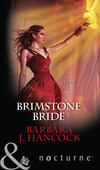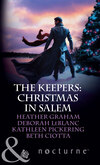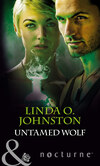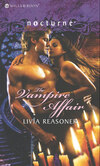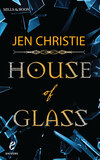Loe raamatut: «House Of Shadows»
“If this is our nirvana, then I’ve died happy, Penrose.”
The world had turned inside out. She was staring at candles that burned under the water. They were a different kind of fire.
She looked up at Keat. He was a different kind of man. Not a dark twin to Carrick. And what if this really was her brief nirvana? What if this was the only happiness she could grasp? Wouldn’t Carrick want it for her? Of course he would. Carrick himself said, “Fire has no choice but grab its moment, whatever moment it’s given, and burn.”
A different century. A different kind of fire. A different man, one she couldn’t help but to burn for. Was this the moment she’d been given? It was. She turned to Keat and said, “Take me to bed now.”
“My pleasure,” he replied and reached down for her.
JEN CHRISTIE is a writer who has a passion for reading and writing Gothic romances. Jen lives in St. Augustine, Florida, with her husband and three daughters. She has a love of history and her secret desire is to stop and read every roadside historical marker she drives by.
House of Shadows
Jen Christie
MILLS & BOON
Before you start reading, why not sign up?
Thank you for downloading this Mills & Boon book. If you want to hear about exclusive discounts, special offers and competitions, sign up to our email newsletter today!
Or simply visit
Mills & Boon emails are completely free to receive and you can unsubscribe at any time via the link in any email we send you.
I dedicate this book to my sister Penny, who taught me that life is full of second chances, and they are always worth taking.
Contents
Cover
Introduction
About the Author
Title Page
Dedication
Prologue
Part One
Chapter 1
Chapter 2
Chapter 3
Chapter 4
Chapter 5
Chapter 6
Chapter 7
Chapter 8
Chapter 9
Chapter 10
Part Two
Chapter 11
Chapter 12
Chapter 13
Chapter 14
Chapter 15
Chapter 16
Chapter 17
Chapter 18
Chapter 19
Chapter 20
Chapter 21
Chapter 22
Chapter 23
Chapter 24
Extract
Copyright
Prologue
The grandfather clock tolled, echoing on and on. The sound reverberated in the tunnel until Penrose fell to the floor, covered her ears and buried her head in her skirts. The chimes came from everywhere at once, from all around her and even from within her own mind.
She couldn’t think, couldn’t move. She could only endure. Dust and plaster rained down and pelted her body. Please, she wished, let it be a dream. But she knew it wasn’t. A dream doesn’t hit you with plaster hard enough to hurt. Long, agonizing moments passed. It was as if time ceased.
Quietness returned slowly. The rumbling grew less ferocious until finally the ground was still, and the clock fell silent. Only then did she lift her head and take a breath. Dust filled her nostrils. Coughing, wiping her eyes and face, she called out in a panicked voice, “C.J.?”
He didn’t answer. The only sound was a lone splatter of plaster falling to the floor somewhere in the darkness. She must find C.J. and see if he was okay, but it was too dangerous to crawl around without light.
Remembering that there were candles in the hallway, she began inching toward the door. She planned to grab a candle and hopefully find Carrick so that they could hunt for C.J. together. When she reached the door, she fumbled with the latch until it opened. The house was dark and quiet. Still on all fours, she took a deep, shaky breath and called, “C.J.? Carrick, are you here?”
No answer. She crawled out, stood up and brushed herself off, making sure she wasn’t injured. Her hands traveled the length of her torso, but the lack of pain did nothing to reassure her that she was all right. She was not all right.
The air in the foyer was cold—too cold for August in Charleston. The house felt different. It smelled odd, of lemons and lavender. Something was wrong. She knew it in her bones.
“C.J.?” Desperation turned her voice harsh. “Carrick? Please! Answer me.”
Still nothing.
Her eyes adjusted to the light, and she saw the grandfather clock standing against the wall. Standing. Not toppled over as she’d witnessed moments before. She looked around wildly. The table that normally held the candles wasn’t there anymore. The chandelier hung still and straight as if it hadn’t even moved, let alone swung wildly while the earth shook.
But what took the breath right from her lungs were the paintings. They were different—with odd, angular images in them. The more she looked around, the more uneasy she became. Yes, something was very, very wrong.
“Carrick?” she called again, taking minute, untrusting steps toward the great room, her hands pressing the air in disbelief. “Carrick! C.J.? Please?” she kept repeating in a whiny, almost begging manner. She held a last bit of hope that the world would right itself, and she’d see the familiar features of Arundell. Her Arundell. Not this twisted imitation.
When she entered the large parlor, she saw moonlight and shadows dancing around the room, revealing a dark doppelgänger of the room she knew and loved. The cold air around her made it scarier and even less familiar.
Yes, the bones of the room were the same. The same lofty ceiling, the same shape of the windows, even the familiar gouges in the doorway that marked the heights of the Arundell boys. But the essence had changed.
Everything had changed. She tried to reconcile the two different versions of her home—one familiar and one not—but she couldn’t. It simply wasn’t Arundell Manor.
Yet it was.
She went to the window and looked out. The world outside glimmered bright and white beneath the moon.
Bright and white. Snow.
No peaceful pond with a lazy oak tree beside it. No familiar road winding through the Charleston countryside straight to the front doors of her home. Only bare land covered in white stretched all the way to the horizon. Stepping away from the window as if it burned her, she found herself gasping for breath. She wanted to scream, to wail and cry for help, but she had no voice.
She took fast, short steps and went from room to room on the first floor, seeing unbelievable and frightening items everywhere she turned. The house had always been extravagant, but now it seemed garish. Every room was crammed with shiny and bizarre objects, things she didn’t understand and was afraid to touch.
A huge mirror hung on the wall by the kitchen and her own shadowy form reflected back at her. Even she looked different. It was as if a ghost stared at her, coated in dust, hair wild and tumbling, the whites of its eyes glowing brightly. She had a horrible thought as she looked at herself. She’d died.
“I’m not dead,” she said loudly, voicing that horrible thought. A worse thought sprang up behind it. Perhaps she’d been trapped in a kind of purgatory. A place between life and death.
“No.” She shook her head wildly. So did the shadowy figure in the mirror. Leaning forward, she insisted to the image, “I’m alive. Alive.” But her image seemed to stare back at her with accusing eyes and Penrose backed away, shaking.
The kitchen was unrecognizable, with silver equipment that had blue flashing lights on the different pieces. She knew it was a kitchen because of the sink, the knives that hung from the wall and the bowl of fresh fruit sitting atop the counter. A piece of paper lay beside the bowl, and by the dim blue light she read:
Dear Keat,
Welcome back to Arundell. Everything should be in order. The kitchen is stocked. The robots have been delivered and set up. If you need anything, just call. Enjoy your time by yourself. Please, try to relax. Stop worrying. You do your best work that way.
—V
The note called this home Arundell, but unless the world had changed overnight, this was not Arundell. Not the Arundell she knew.
Part One
All in the dark we grope along,
And if we go amiss
We learn at least which path is wrong,
And there is gain in this.
—Ella Wheeler Wilcox
Chapter 1
Charleston, South Carolina
August 18, 1886
Penrose Heatherton stood at the window, her face lifted to the night sky, hoping for wind. But there was no wind to speak of. The skies were speckled with stars. The moon hung lazy and bright. It was a perfect Charleston summer evening and gave no hint of the troubles that lay ahead of her.
It was hot enough to boil water that night, and she wore her underthings in a futile effort to stay cool. The clothes clung to her damp skin and her black hair hung in sweaty strands. She fanned herself listlessly with the want ads from the newspaper. The effort only made her hotter. It didn’t help that she’d just returned from the kitchen downstairs where she’d washed dishes for hours to help reduce the amount of rent she had to pay.
Rent. A knot of worry twisted in her chest and she rested her head against the window frame. Rent was due in the morning, and, even at a reduced rate, she had no way of paying. Renting her room at The Winding Stair Inn & Pub had already taken all of her funds.
She turned her face to the moon, pleading for wind. Tattered clouds sailed across it, scattering silvery light on the ground. None reached her. “Please,” she whispered, hoping, waiting, for a gust to come and cool her down.
It seemed that, lately, she was always waiting. For a cool breeze or a hot meal, for a permanent job, for any sliver of relief, no matter how small, that would help fix the mess her life had become. She was tired, so very tired of waiting.
She tossed the want ads out of the window and watched as they fluttered to the ground. Worthless. If she’d learned one thing since her mother died six months earlier, it was that relief didn’t come easy. If it came at all. No, she was beginning to understand the bitter truth—that if you wanted relief you had to grab it for yourself.
But you can’t grab the wind, so she stood there sweating. Sighing, she went to the cot and lay down. If it got any hotter, even one degree, she would melt into a puddle. But right when she thought that was about to happen, there came a change.
A gust of wind slipped through the window and eddied in the small space. It was a strange wind. Wintery, cool and dry, with a touch of wildness to it. The breeze tossed about the room and swirled around Penrose like a cool promise. She sat up, feeling it slip and slide over her skin, and she had the sense that something, anything could happen.
Right at that exact moment, she heard the sound of boots walking down the hall. The footsteps belonged to Mrs. Capshaw, the landlady of The Winding Stair Inn & Pub. Her walk was distinctive. When it came your way you knew she wanted something, and sure enough, it was coming Penrose’s way.
Not a moment later, the door flew open as the landlady swept into the tiny room. There was barely space for her, but she didn’t seem to care. Mrs. Capshaw was an ample woman with frizzy red hair and a bosom that sat like a shelf over her stomach. She had sharp, assessing brown eyes, which right then took in the sight of Penrose lounging on the bed. She said in her tough-as-nails voice, “Look sharp, Penny. There’s an opportunity for you downstairs.”
Instantly, she had Penrose’s attention. “What opportunity?”
Mrs. Capshaw was an enterprising woman, always on the lookout for any venture that would be advantageous. Coming from her, an opportunity could mean a million different things, most of them dubious. But opportunities were rare, and Penrose was desperate.
Another cool gust of wind blasted into the room, slamming the door shut. The older woman yanked it open again and held it in her meaty fist. “If you’re clever,” she said, leaning over Penrose and staring at her hard, “and I know you are, you’ll listen carefully.”
“I’m listening,” said Penrose. She rubbed her arms as she listened. The temperature in the room must have dropped twenty degrees.
Mrs. Capshaw continued, “Right at this moment, there’s a woman sitting at a table downstairs. She reminds me of you so very much, young and full of distress. Another sad story, I’m sure. Except unlike you, she’s downright foolish. I think you might have a chance to secure a well-paying—” she looked at Penrose meaningfully “—and respectable job.”
Penrose jumped up. “Tell me. Is it a teaching position?”
“No. Better.” Mrs. Capshaw’s sharp brown eyes narrowed and she lowered her voice to a whisper. “The lady is on her way to a post that her agency secured for her. She needs a room while she travels.” She smiled, a small twist of the lips. “But she is sitting there downstairs right now, blabbing for all the world to hear about her doubts and fears over the position.”
That was interesting news. “Go on,” said Penrose.
“She’s to report the day after tomorrow. Seven a.m. sharp. But, she’s reluctant. In fact, she’s more than reluctant.”
“More than reluctant?”
“She’s terrified,” Mrs. Capshaw blurted out. “I’m telling you straight off to get it out of the way.” She shrugged as if it were of little consequence. “She’s heard rumors. It seems her agency was less than forthcoming about the post. Her employer is a troubled individual and the house might be haunted.”
For the first time, Penrose felt wary, but just a bit. It was a job, after all. She hedged. “How troubled? And what kind of hauntings? The rumors must be awful for her to reconsider.”
“Awful?” Mrs. Capshaw threw her hands into the air. “What can be awful about regular income and a roof over your head?” Her voice lowered an octave as she said, “And wages that would make your eyes pop right out of your head. And, truthfully, do you believe in ghosts?”
“No, I don’t.” Penrose felt breathy. For decent wages, she’d be blind to a lot of things. Including ghosts. And regular pay? Something she could barely imagine. But she wasn’t a babe in the woods. She was twenty-one. Old enough to know a thing or two. Something was wrong. “Still...why such high wages? Something doesn’t ring true. Maybe there’s truth to the rumors.”
Mrs. Capshaw huffed. “‘Still’ nothing. You’ve been here six months already. Six months since your mother died and no position to speak of. No prospects, either! I’ve watched your purse dwindle, your belongings dwindle. You’re all boiled down like soup left too long on the stove. Only scrapings left.” She wagged her hands in the air. “Penrose Heatherton, you are in debt to me. Not a small amount, either. And if you ask me, that’s what awful is.” She pursed her lips. “And, yes, the post seems...suspicious. But, if you listen closely, it also sounds like an opportunity.” She lifted a pearl comb from the nightstand. “This is the only thing of value you have left, isn’t it? And rent’s due tomorrow? Do you think I’d take a comb in payment? You’re a sweet girl, but you’re fooling yourself if you think you’ll find work as a schoolteacher. Not in this town. Not with your name.”
“But my mother had such a respectable finishing school—”
“No offense, but you are not your mother. She was a Northerner. Sent to the finest schools and from a well-regarded family. She had credentials, Penny. Credentials. The big families in this town adored her because she attended those fine finishing schools. Yes, she fell from grace, there was always that.”
“You don’t need to remind me that I was her downfall,” she snapped. Penrose always had trouble concealing her anger when the subject was brought to her attention.
“I’m not. A baby is a baby to the likes of me. But not to them. Not to those fancy folks. They never minded you as an assistant to her. But an illegitimate child as an assistant is one thing. As a teacher, it’s quite another. Plus, your name. Penrose.” She sighed. “Your mother did you such a disservice giving you your father’s surname as a first name. She thought she was clever giving you that name! Calling him out and exposing him as the father. Those were passionate times, I’ll give her that. But she was ignorant. The South doesn’t work that way and she was foolish to think she’d change it. Oh, those abolitionists had such grand ideas, didn’t they? No bigger name around here. Like a splinter in the eye of the most powerful family. You’ll have a tough road around here. Surely my words are no surprise to you.”
No, they weren’t a surprise. Penrose shook her head. “Just painful.”
“The truth hurts, Penny. It hurts.” Mrs. Capshaw leaned down and put her hand on the bed. It creaked under her weight. “Just like when that young man stopped calling on you and I told you he wasn’t coming back. I say it plain. You’ll never find work on your own here. No education other—”
“My mother educated me.” Heat burned her cheeks.
Mrs. Capshaw pushed down on the bed. “Let me finish, girl. I said no education other than from your mother. It may be a fine education, but there’s no stamp of a finishing school on your papers. In fact, you have no papers. Even worse, you’re now living in a pub by the wharf. Your stock is dropping by the minute...what’s left for a girl like you? Hmm?” She loomed over Penrose, her shadow falling across her.
Penrose stared out of the window. A sliver of the moon was visible and she focused on that. Her chest felt tight, as if a belt were strapped around it and someone was tugging. Was it anxiety? Or something more? She remembered the strange breeze from earlier and felt the odd, prickly sensation spread over her once again. Change was in the air. Perhaps she should welcome it. “I deserve a break, don’t I?” Her words came hot and fast. “Don’t I?” She looked at Mrs. Capshaw with a pleading, angry gaze.
“You said it, Penny. Right from your own mouth. You deserve a break. But if you think a break is going to waltz in here and lay itself in your lap, you’re mistaken.” She shook her head, her frizzy hair barely moving on her head. “Listen, some girls are tough to their bones. Others are soft. Those are the ones that wilt. Still others, and I think you’re one of these—are malleable, able to bend and sway. Adapt to changing conditions. You need to adapt. And I’m giving you an opportunity to do just that. What better than to work for a man who doesn’t give two shakes what society thinks?”
Mrs. Capshaw was right. Penrose nodded.
“Get off that bed. Stand up and listen to me. Listen to what the post entails and then make your choice.” She lifted her hand and stood straight.
Penrose slid from the bed and stood beside her landlady. “I’m listening.”
Mrs. Capshaw seemed to soften then. She blinked and nodded, and gave a halfhearted attempt at a smile. “I’m sorry, dear. Life did you wrong. But I’m not a charity. You have to act fast.”
“The post,” Penrose reminded her. “I need more details.”
“It’s a single man, a bachelor, and he needs someone to help him in his scientific studies. Someone who can write, who has a bright intellect and one who doesn’t mind...”
Everything sounded fine until Penrose heard those words. “Doesn’t mind what?”
Mrs. Capshaw spoke in a rush. “Working nights. He works at night, from sunset to sunrise. Though don’t worry, because it’s respectable. The little miss downstairs told me that the three ladies that walked off before her have never accused him of wrongdoing. He has an affliction, she says. It makes him unsightly, very unsightly, and causes trouble with his eyesight. The sun hurts his eyes and the night is the only time he can see untroubled. But it’s the strange rumors of the manor that scare her so. The hauntings. They whisper that he does odd things. Practices dark arts.” Then she added pointedly. “But those wages...” She named the sum, a figure so high that Penrose coughed.
No, she choked. An amount like that, well, it seemed almost sinful. Penrose floated in an odd place, willing to be tempted, letting her mind imagine the riches of such a sum but knowing that she should be suspicious. Those wages, though. Finally, she said. “Very well, I’m interested. Not committing, but interested. What is your plan?”
“Smart of you to consider it. Just hear me out. I always say don’t let the future toss you about. Sometimes you have to grab it.” She smoothed her frizzy hair down, a useless habit because it just popped right back up again. “My idea is that we’ll help the girl, make the decision easy for her. You’ll steal her post.” She watched Penrose.
“Steal it? Are you serious?”
Mrs. Capshaw nodded. “The girl doesn’t want the job. One look at her face and I knew the truth of it. She let the name of the manor slip...” Her voice trailed off in an odd way.
“I can’t steal her post!”
“Now you think to be ethical? Right now, when your whole future is blank—a black hole—and your present is nothing but hunger. Yes, life did you wrong. But you don’t even have money for the rent! I’ll have to move your room again, to the porch this time. And after that, who knows?” The threat hung in the room.
It would be easier to stand up and grab a future than to sit around The Winding Stair wallowing in the slim pickings that came her way. “I’ll do it.” She didn’t feel entirely convinced, but somehow the words came out sure and strong.
“Very well,” said the landlady. “The plan is simple enough. You only have to show up a day early. Let them know the agency sent you instead of her. Plead prudence on your early arrival. Better to be early than late. I’ll let the young lady downstairs know the bad news. Let her down easy, let her know it was for the best. By arriving early, there’s no mistaking the job is yours. I’ll break the news to the young lady.” Mrs. Capshaw looked away as she spoke.
“Ah, I get it now. I wondered why you were so generous with an opportunity,” Penrose said spitefully. “And once you tell the poor girl she’s been wronged, you’ll give her the good news that you have a room to rent her. That, strangely, one was just vacated...”
The woman laughed, short and bitter, and her belly heaved. “You’re a smart one, aren’t you? Yes, I’ve seen her purse, and it’s heavier than yours. Don’t judge me. I have to survive. Just like you.”
The tight feeling in Penrose’s chest constricted even further. It became hard to breathe. “Mrs. Capshaw, I don’t know... It seems like such a scheme.”
“Well, you only have to listen to the girl to know I’m right. She’s downstairs right now, blabbing away to Charlie, telling my husband all her woes.” She plucked the heavy black gown from the peg on the wall and tossed it in Penrose’s direction. It sailed across the room like a dark ghost and covered Penrose in an embrace.
Mrs. Capshaw continued, “At the very least, come and hear her for yourself.”
The dress hung limply over Penrose. She felt small and uncertain all of a sudden.
“Don’t dally,” said Mrs. Capshaw, coming over and grabbing the dress, then holding open the bodice so that Penrose could step into it. “Here. Time’s wasting, always wasting. We have to hurry.”
Penrose stepped into the dress. The gown swallowed her. She had always been petite, but now she was thin—too thin.
Mrs. Capshaw didn’t seem to notice and she stood back, admiring Penrose. “That’s more like it. You’ll see. It will all work out. Turn around, dear,” she said.
Penrose turned, and the woman drew the gown tight and began buttoning it up. “This is your only dress?” she asked with concern. “The one you wore to your mother’s funeral?”
“I’m sorry. It’s all I have.” The rich black fabric had faded to gray at the elbows and the hem had turned to fringe. “I sold the others,” she whispered, hating the need to confess the small, shameful adjustments she’d had to make in the past few months.
Mrs. Capshaw sighed. “It’s so morose. I can only hope a somber look will work in your favor.” She tightened the final button and cinched the ribbon into a bow. “Now, where’s your bonnet?”
“I’ll get it. It’s at the window. I need to comb my hair, too.” In her heart she was still reluctant, her decision not yet made. But she went through the motions, fighting the comb through her inky hair. While she wrestled her hair into a tight bun, Mrs. Capshaw explained what she was to do.
“Charlie can drive you to the manor,” she said, referring to her husband and bartender. Even though Charlie was married to Mrs. Capshaw, he was no Mr. Capshaw. Simply Charlie. She continued, “You’ll have to sleep the night outside. We can’t risk you leaving tomorrow. She might catch on in the light of day. Anyhow, it shouldn’t be too hard. The gentleman’s name is Mr. Carrick Arundell. Remember, seven sharp. Very specific about that. Don’t worry about the little miss here, it’s all for the best.” She took Penrose by the hand. “Come now, let’s go down the stairs.”
When they reached the landing, Mrs. Capshaw put a hand on her shoulder. “Hold it,” she said. “Hmm. Can’t do to arrive without any belongings. It will make you look wanting. Needful.” She twisted her lips as she thought and then lifted a finger. “I’ve got it. Just a moment.” She left Penrose on the stairs.
Penrose heard her then. A breathy, feminine voice wafting up the stairwell. She couldn’t help herself and crept lower, down the winding staircase until she could see her—with the benefit of a wall that partially hid Penrose from view. The woman sat at the corner table. Even though the late crowd had begun to arrive, Penrose could still see her clearly.
No, this woman hadn’t sunk to the level that she had. Oh, certainly she oozed that refined look of genteel suffering, a bit worn at the edges. No doubt, there was even a small, graciously suffering smile on her lips. The kind of smile that Penrose couldn’t quite muster anymore.
The little blond head bobbed as she spoke. “It might not be worth the fear, the fright of living with such a man,” she drawled.
What could be so frightening about a mere man? Nothing, that’s what. But to make matters worse she continued, “I’m not so hungry that I will endure fright and intimidation. Not me. I can always stay with my sister. Perhaps another might endure such a thing, but I’m hesitant. Are things so bad that I must suffer for employment?”
Penrose’s eyes burned, and her fingers itched with the urge to strike out. Yes, they are, you silly woman. Yes, they are.
“But what about those wages?” Charlie asked.
The woman named the amount of pay, and a small choking noise escaped from Penrose’s lips. Both the woman and Charlie turned in her direction and she slunk back into the shadows.
“They say,” the woman continued in a grave voice, “that he must pay such a wild sum because of all the awful things that go on in that house. I’ve heard he’s wicked. I’ve heard he’s...dark.”
“The men talk, you know. I’ve heard the same.” Charlie stood leaning over the counter and wiping a whiskey glass with his rag. “And worse, too. Still, those wages. Any man would be proud to earn such a sum for a year’s labor.”
“Oh, that’s not a year of wages. That’s for a month.”
The shrill clink of the glass slipping from Charlie’s hand and hitting the counter rang out. Or maybe it was the sound of her conscience turning to ice. But whatever decency was left inside her hungry soul fled when she heard that sum. Right then and there, her mind turned rock-solid certain. The risks be damned. Dark arts meant nothing to her. That job would be hers. All she needed was one paycheck, just one, and she could recover. She could start again in a new city. She could open her own school with a new identity.
Distinctive footfalls came down the stairs. Penrose turned and saw Mrs. Capshaw standing on the rise above her. “Well?” she asked in a hearty whisper. “Heard enough?”
Penrose nodded. “Have you the bag?” she asked pointedly.
“Of course.” Mrs. Capshaw held it out. “I stuffed it with newspapers to look full.”
“It’s perfect,” said Penrose, taking the bag. It was dusty black and light as air. “I’ll go and wait outside for Charlie.”
“Of course. I’ll let him know.” The woman grabbed Penrose by the arm. “Penrose, you won’t regret this. Trust me.”
Trust was not a word she associated with Mrs. Capshaw, but the woman seemed sincere, and she nodded in reply. They descended the rest of the stairs together. Once on the ground floor, Penrose moved through the pub area swiftly, Mrs. Capshaw right behind her. Charlie looked up and smiled from behind the bar, but before he could say a single word to her, Penrose opened the door and stepped outside. Not once did she look at the woman. She couldn’t bear to. She didn’t want to risk developing a conscience and changing her mind.
Outside, she leaned against the wall of the inn and took deep breaths. What exactly was she doing? Mrs. Capshaw stood stoically beside her.
Penrose breathed a sigh of relief when Charlie emerged from the pub. “Are you okay, Penny?” he asked, taking a long look at her before turning to his wife. “What’s going on? Why did you pull me outside?”
“I need you to ready the buggy. There’s something you need to do.”
“Oh, no,” he said with a sigh. “What are you up to?” He shook his head. “I should’ve known—you had that look about you.” Turning to Penrose, he said, “Has she pulled you into some plan?”





